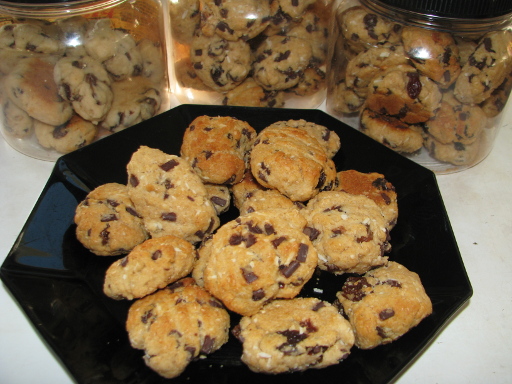Chocolate Chip Cookie Biscuits with Reduced Badness
This recipe was suddenly developed after opening a pack of Griffins Shrewsbury biscuits and finding that most of the package was air and packaging. Out of frustration at the waste and the fact that it was getting hard to find biscuits that weren’t just highly packaged dollops of industrial waste held together with palm oil, fat and corn syrup, I decided to develop a nice easy to make biscuit that used basic ingredients and tried to minimise the saturated fats and oils, and reduce the amount of sugar.
I started off with a couple of good recipes to use as a basis and replaced most of the butter with canola oil, and just reduced the sugar. I figured I would be able to get a good structurally sound biscuit that tasted good by applying a pottery glaze development technique to the recipes. The technique is called a Line Blend which has two recipes made up and then some blends of the two mixes made up to create about five different recipes which would be of known composition. So I had one recipe and quickly developed what I thought was an extreme version of the recipe that did away with nearly all of the butter and most of the sugar. What I hadn’t expected was that this extreme recipe worked pretty well. I never did get around to doing the line blend.
The biscuit base is quite versatile and I will admit that any time I or my partner make it, it is different owing to a different selection of spices or dried fruit, or whether muesli has been chucked in there as well. Also due to the fact that we’re both terrible at actually sticking to a recipe.
I should add that they taste pretty good!
Without further ado, here is a stunning picture of one of the batches.

And here is the recipe.
Reduced Badness Chocolate Chip Cookies
Makes 60-80 biscuits (Well, small ones anyway)
50g butter
180mL sunflower oil
½ cup sugar
3 Tbsp maple syrup or honey or golden syrup or brown sugar
3 Tbsp milk powder
4½ cups flour
3 tsp baking powder
9-10 Tbsp water (add more to get a medium soft dough) – equivalent to 150mL of water. I find a wetter mix with about 150-180mL of water is easier to shape into biscuits.
½ cup chocolate chips
1 cup cake fruit mix or assorted dried fruit (chopped)
Spices – suggestions: ginger powder, cinnamon and nutmeg, chilli powder
Coconut (optional)
Melt the butter and then just mix everything together.
Good texture can be achieved with rolled oats or muesli which has been through a blender.
Make the biscuits to the size you want on an un-oiled baking tray
Bake at 180°C for 15-20 minutes swapping the tray positions midway through. Basically bake until they start going golden. A dry mix will require less baking time than a wet mix. If your mix is quite wet you can expect baking times up to 25-30 minutes.
Allow to cool on the trays for a little bit. They will be soft initially but will firm up as they cool. Transfer to racks to cool when they are firm enough to release from the trays.
You can download the recipe as a pdf here if you would prefer: Chocolate_Chip_Cookies_Reduced_Badness.pdf

Out of interest, and to make sure we weren’t kidding ourselves about the relative goodness of our creation, we put the recipe into one of the online nutritional analysis calculators. The following results are for 100g of the baked biscuit mix. The tool can be found here: www.foodstandards.govt.nz.
Nutrition Information
| Average Quantity per 100 g | |
| Energy | 1810 kJ |
| Protein | 6.3 g |
| Fat, total | 18.3 g |
| saturated | 4.7 g |
| Carbohydrate | 59.0 g |
| sugars | 27.3 g |
| Sodium | 80 mg |
Each biscuit is about 18-20g.
Here is the report the analysis issued: Nutritional_Analysis-FoodStandards.pdf
When we compare these results with the equivalent type of biscuit, Arnotts Farmbake Chocolate Chip Cookies we get a slightly lower energy content, and total fat content. The big differences are in the total fats vs saturated fats balance, and the total sugar, and salt contents. In the case of saturated vs total fats, the recipe presented here is less than a third saturated fats compared to half for the commercial biscuits. The salt is less than a third of what is in the comparable Arnotts cookie, while the sugar content is about 75% of what is in the Arnott’s cookie. The Arnotts analysis sheet has been copied here just in case the link is lost.
Another analysis we did for this recipe yielded results for dietary fibre (1.62g/100g), Cholesterol (10.9mg/100g), and trans-fatty acids (0.06g/100g).
So we were pleased to find we had been successful in reducing the badness as well as the amount of packaging and transport waste. Of course we could always stop eating cookies all together and eat kale and water, but where would the fun be in that?

This is a recipe. Of course it’s open source! Free to share, commercial use is fine, attribution is not required and all that. After all that’s what you do with recipes eh?